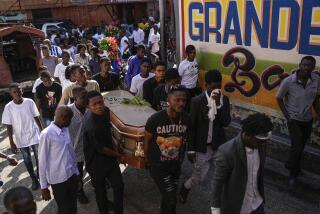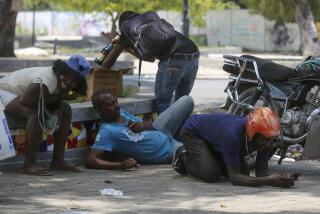Fired Haitian Strongman Held Under House Arrest
- Share via
PORT-AU-PRINCE, Haiti — Lt. Gen. Henri Namphy, the former Haitian strongman who was fired after clashing with the civilian president he helped put in power, was under house arrest Saturday at his home outside the capital, according to two of his close relatives.
The relatives said that Namphy’s house was surrounded by troops loyal to his chief army opponent, Col. Jean-Claude Paul, whose refusal Tuesday to obey the general’s order transferring him to a powerless staff job touched off the current Haitian crisis.
They said that the troops, from Paul’s powerful Dessalines battalion, refused to permit anyone to enter or leave Namphy’s house or to telephone the former army commander in chief who ruled Haiti for exactly two years after the end of the Duvalier family dictatorship in February, 1986.
Despite an air of apprehension aroused by four days of confrontation between President Leslie F. Manigat and Namphy, Port-au-Prince remained peaceful Saturday, and life on the streets appeared normal. Although there were some random gunshots heard in the capital during the night, there was no sign of unusual military activity.
Haitian Information Minister Roger Savain refused to comment on the relatives’ report of Namphy’s house arrest, but another top government official who asked not to be named said it was true.
Manigat sacked Namphy and two other army generals Friday night, charging them with “a sort of insubordination” in attempting to proceed with controversial army transfers and retirements that the one-time strongman already had agreed to postpone.
It was Namphy’s order transferring a dozen officers, including Paul--a strong but controversial troop commander who is under indictment in the United States for drug trafficking--that triggered the crisis Tuesday.
Refused to Obey
After Paul refused to obey the order, according to a Port-au-Prince newspaper with close ties to the army, the controversial colonel escaped an attempt by Namphy to forcefully disarm him and his bodyguards.
Retreating to their barracks, which adjoin the presidential palace in downtown Port-au-Prince, Paul and his troops vowed to die before giving in to Namphy, the newspaper reported. Paul reportedly then called on Manigat for help.
Apparently alarmed by the prospect of an intra-army war, Manigat then intervened on constitutional grounds as nominal head of the armed forces and on Wednesday rescinded Namphy’s order.
Manigat and Namphy met for five hours Wednesday, along with Defense Minister Williams Regala, who was Namphy’s right-hand official in the army-led Provisional National Government that ruled Haiti from 1986 to 1988. After the meeting, Namphy agreed to an army high command communique accepting “for the time being” Manigat’s right to overrule the controversial transfer order.
Pledge Violated
Details of the power struggle remain unclear, but in his Friday decree dismissing Namphy as army commander in chief, Manigat said that the general and his two subordinates violated their pledge to set the transfers aside “and began to execute the order.” It was then, the presidential communique said, that it was decided to cashier Namphy.
Unverified reports from diplomats and reliable Haitian sources said that Namphy lost the power struggle because he failed to line up the support of other army units before he moved to strip Paul of his troop command. Paul’s Dessalines battalion, between 850 and 1,000 strong, is the best of the country’s two operational infantry battalions. The other is the Leopards, about 750 to 850 troops, based just outside the capital’s suburb of Petionville.
According to one source, when Namphy asked the Leopards for support against Paul’s Dessalines battalion, their commander told him he had already pledged not to intervene. Namphy then found himself powerless.
Constitutional Stand
Although Manigat appeared to have aligned himself with the controversial Paul in the confrontation, he denied that such personal considerations played a part in what he described as a constitutional stand for civilian control over the military.
Nevertheless, Paul was clearly the beneficiary of Manigat’s decision.
The colonel’s troops were widely believed to have played a major role in a blood bath on Nov. 29 last year that derailed the country’s first attempt in 30 years to hold free elections. Some sources said that Paul resented having been ordered by Namphy to use violence in upsetting the election and that there has been bad blood between the two ever since.
In March, a federal grand jury in Florida indicted Paul on charges involving the shipment of U.S.-bound cocaine from the airstrip of his private ranch to the Bahamas. The Manigat government reacted as if the indictment were an insult to Haitian pride and said that it had no evidence from U.S. officials or others of any wrongdoing by Paul.
The colonel also has been widely reported to control a major share of the smuggling of untaxed consumer goods in Haiti.
Extraordinary Loyalty
Sources close to the army said that Paul has won extraordinary loyalty from his officers and troops by sharing the spoils of the trade in contraband down through the ranks.
Although Manigat has portrayed his constitutional action in unseating Namphy as the kind of evidence of Haiti’s struggle toward democracy that the United States and other aid-giving countries have sought, an American official said that Washington foresees no alteration in policy.
“I don’t think the events would encourage us to change our policy toward Haiti in any way,” said a U.S. official here.
More to Read
Sign up for Essential California
The most important California stories and recommendations in your inbox every morning.
You may occasionally receive promotional content from the Los Angeles Times.













